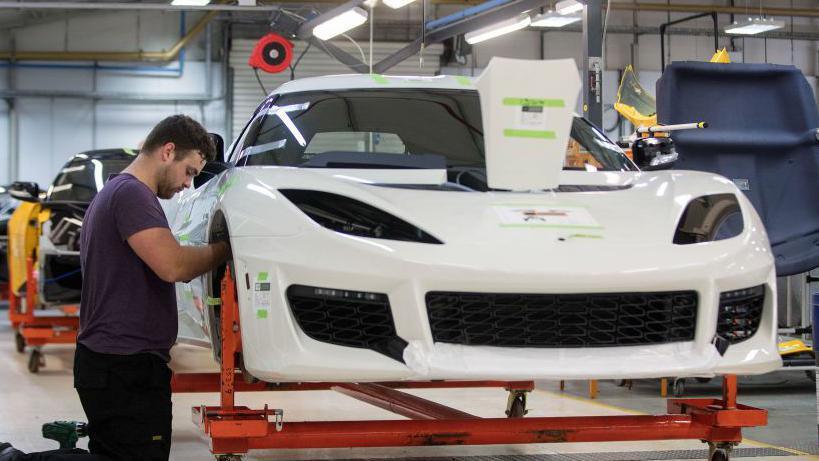Lotus considering shifting UK production to US

- Published
Sportscar maker Lotus is considering ending production at its home in the UK in favour of setting up a new plant in the US, the BBC understands.
Such a move would put 1,300 jobs at risk at its headquarters in Hethel, Norfolk.
Lotus refused to comment when asked about any plans, which were first reported by the Financial Times, but sources within the company told the BBC the situation is under review and taking production to the US was under consideration.
It comes after production in Hethel was temporarily suspended due to disruption caused by the introduction of tariffs on cars being imported to the US.
America is a major market for Lotus but tariffs threaten its business, with US sellers required to pay taxes of 25% on imports of cars and car parts.
Figures released on Friday for the UK's car industry revealed exports to the US had halved as President Donald Trump's tariffs caused some car makers to halt shipments.
The UK government and Trump administration have agreed a deal to lower tariffs on UK-made cars entering the US to 10%, but it is not due to come into force until the end of June, meaning manufacturers have had to pay the higher rate to date.
Lotus is majority owned by the Chinese group Geely, which is in the process of reorganising its diverse portfolio of car brands, which also include Volvo, Polestar and Lynk and Co.
The company currently builds cars in Norfolk and in Wuhan, China.
Lotus was founded in the early 1950s by engineer Colin Chapman, moving to Norfolk in the 1960s.
In April, the carmaker announced 270 jobs would be cut "amid volatile and evolving market conditions including the US tariffs".
The decision followed previous job losses last year, but the company said it remained "committed to the UK" and that the restructuring was "vital to enhance our competitiveness".
President Trump has raised taxes on various goods entering the US in recent months in an attempt to encourage businesses and consumers to buy more American-made goods.
Car shipments to the US already incurred a 2.5% tariff, but now face higher rates.
However, if a deal with the US had not been reached, UK exports would have been taxed at 27.5%, as opposed to 10%. The lower tariff only applies to 100,000 British cars being imported to the US per year, which matches the number of vehicles the UK exported across the Atlantic last year.